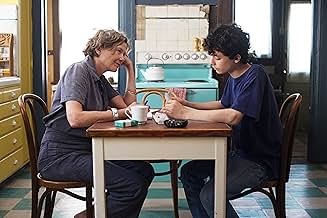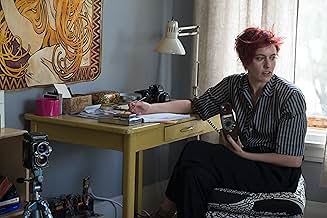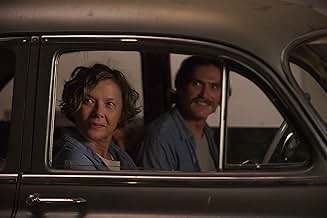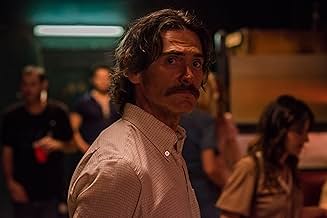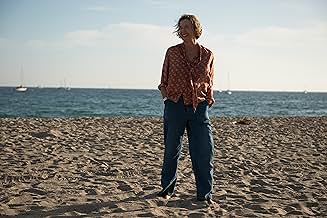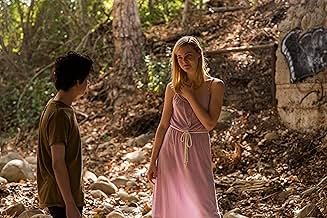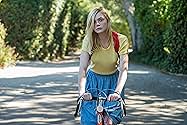CALIFICACIÓN DE IMDb
7.3/10
51 k
TU CALIFICACIÓN
La historia de un chico adolecente, su madre, y dos mujeres que ayudaron a criarlo entre el amor y la libertad de California del sur en los 70 y 80.La historia de un chico adolecente, su madre, y dos mujeres que ayudaron a criarlo entre el amor y la libertad de California del sur en los 70 y 80.La historia de un chico adolecente, su madre, y dos mujeres que ayudaron a criarlo entre el amor y la libertad de California del sur en los 70 y 80.
- Dirección
- Guionista
- Elenco
- Nominado a 1 premio Óscar
- 15 premios ganados y 82 nominaciones en total
Vitaly Andrew LeBeau
- Young Jamie Fields
- (as Vitaly A. Lebeau)
- Dirección
- Guionista
- Todo el elenco y el equipo
- Producción, taquilla y más en IMDbPro
Opiniones destacadas
This is a very strong film, unless you only like fast-paced action films; I'm going to go out on a limb and say you'll probably like this movie.
As is the norm with A24... it's a good film.
I don't really have much to complain about. I belied in the world of the film, I believed the characters were real, etc-- the world and logic of the film was well established. There were a few tropes of the genre, but some strong writing and direction makes one look past this without really thinking about it. I actually cared about the story and wanted to see how things played out.
The story is a bit disjointed, but I think that works to the film's benefit due to the type of storytelling it's going for, which overall is very effective.
I'd recommend this film to pretty much everyone that likes good movies.
8 out of 10
As is the norm with A24... it's a good film.
I don't really have much to complain about. I belied in the world of the film, I believed the characters were real, etc-- the world and logic of the film was well established. There were a few tropes of the genre, but some strong writing and direction makes one look past this without really thinking about it. I actually cared about the story and wanted to see how things played out.
The story is a bit disjointed, but I think that works to the film's benefit due to the type of storytelling it's going for, which overall is very effective.
I'd recommend this film to pretty much everyone that likes good movies.
8 out of 10
"20th Century Women" (2016 release; 118 min.) brings the story of Dorothea, a divorced woman in her mid-50s, and her 15 yr. old son Jamie. As the movie opens, we are reminded it is "Santa Barbara, 1979", and Dorothea's car is engulfed in flames while she and Jamie were grocery shopping. When they finally get home, we also get to know Abbie, a 24 yr. old orange-haired photographer, and William, a Mr. fix-it-all, who both are renting rooms at Dorothea's house. Then there is Julie, the 17 yr. old who hangs out at the house for no apparent reason. When Dorothea feels she cannot handle the unruly(?) Jamie by herself, she enlists the help of Abbie and Julie. At this point we're 15 min. into the movie, but to tell you more of the plot would spoil your viewing experience, you'll just have to see for yourself how it all plays out.
Couple of comments: this is the long-awaited new movie from writer-director Mike Mills, who last surprised us with the outstanding "Beginners" (now already 6+ years ago). Here he brings a character study of a group of 5 people in the late 70s. This movie immediately connected with me, as I saw pieces of myself in "young" people: Abbie (Born 1955), Julie (born 1962) and Jamie (born 1964). I was born in 1960. The movie features an all-star ensemble cast, with an almost unrecognizable Great Gerwig as Abbie (and on the heels of another outstanding role in the recent "Jackie"), Elle Fanning in perhaps her best role to date as Julie, Billy Crudup as William, and newcomer Lucas Jade Zumann as Jamie. Surely we have not seen the last of him. But the biggest applause must go to Annette Bening, who brings perhaps the finest performance of her career as the well-intended but at times confused, sad and/or lonely Dorothea. Mills brings us these characters in rich detail and nuance, much to the viewing public's delight. Ever wonder what a "cool cigarette walk" is like? You'll find out in the movie. Music plays a ventral role in the movie. There is a fine original score (mostly electronic) by Roger Neill, but even better are the song placements (Talking Head, Black Flag, David Bowie, the Clash, and many others).
"20th Century Women" premiered to great acclaim at the New York Film Festival last Fall. The movie opened wide this weekend and I couldn't wait to see it. The Friday evening screening where I saw this at was attended nicely although by no means close to a sell-out. Doesn't matter. This is one of the finer movies of the year, for me anyway. If you like a richly-developed character study with an all-star ensemble cast, you cannot go wrong with this, be it in the theater, on VOD or eventually on DVD/Blu-ray. "20th Century Women" is HIGHLY RECOMMENDED!
Couple of comments: this is the long-awaited new movie from writer-director Mike Mills, who last surprised us with the outstanding "Beginners" (now already 6+ years ago). Here he brings a character study of a group of 5 people in the late 70s. This movie immediately connected with me, as I saw pieces of myself in "young" people: Abbie (Born 1955), Julie (born 1962) and Jamie (born 1964). I was born in 1960. The movie features an all-star ensemble cast, with an almost unrecognizable Great Gerwig as Abbie (and on the heels of another outstanding role in the recent "Jackie"), Elle Fanning in perhaps her best role to date as Julie, Billy Crudup as William, and newcomer Lucas Jade Zumann as Jamie. Surely we have not seen the last of him. But the biggest applause must go to Annette Bening, who brings perhaps the finest performance of her career as the well-intended but at times confused, sad and/or lonely Dorothea. Mills brings us these characters in rich detail and nuance, much to the viewing public's delight. Ever wonder what a "cool cigarette walk" is like? You'll find out in the movie. Music plays a ventral role in the movie. There is a fine original score (mostly electronic) by Roger Neill, but even better are the song placements (Talking Head, Black Flag, David Bowie, the Clash, and many others).
"20th Century Women" premiered to great acclaim at the New York Film Festival last Fall. The movie opened wide this weekend and I couldn't wait to see it. The Friday evening screening where I saw this at was attended nicely although by no means close to a sell-out. Doesn't matter. This is one of the finer movies of the year, for me anyway. If you like a richly-developed character study with an all-star ensemble cast, you cannot go wrong with this, be it in the theater, on VOD or eventually on DVD/Blu-ray. "20th Century Women" is HIGHLY RECOMMENDED!
Just like the central character in this film, I was born in 1964. Just like him, I was 15 in 1979. My mother was only two years older than his mother. So, you'd think I could relate to this film. But I couldn't, really.
Maybe that is because I didn't grow up in a bohemian single parent household in Santa Barbara. Life for 15 year old Jamie was different than it was from me. I had two parents, but I didn't have a skateboard.
Yes, I can remember Jimmy Carter being president. But I didn't see his impressive and remarkably modern 'Crisis of Confidence'-speech, which is an important feature in one of the scenes of this film. There's only one thing which caused somewhat nostalgic emotions: making mix tapes. Yes, I did that too.
'20th Century Women', which is essentially about a mother raising a son, has nice scenes. I really liked the explanation about punk rock music to the 55 year old mother: she complains about the lack of beauty, but exactly that is the strength of it. There are many such scenes, with small but meaningful events, telling a lot about how life was in the seventies.
But the story itself didn't captivate me. Jamie's mother thinks she can't raise Jamie on her own, so she involves his best friend (a girl) and a photographer who rents a room in the house (also a girl). They teach him lots of things about sex, music, seducing women, and life in general. All characters are in a way in search of there own destiny. So, a lot of soul searching is going on. Anyway, the film contains one of the best one-liners I've heard in years: 'Wondering if you're happy is a great shortcut to just being depressed'.
Maybe that is because I didn't grow up in a bohemian single parent household in Santa Barbara. Life for 15 year old Jamie was different than it was from me. I had two parents, but I didn't have a skateboard.
Yes, I can remember Jimmy Carter being president. But I didn't see his impressive and remarkably modern 'Crisis of Confidence'-speech, which is an important feature in one of the scenes of this film. There's only one thing which caused somewhat nostalgic emotions: making mix tapes. Yes, I did that too.
'20th Century Women', which is essentially about a mother raising a son, has nice scenes. I really liked the explanation about punk rock music to the 55 year old mother: she complains about the lack of beauty, but exactly that is the strength of it. There are many such scenes, with small but meaningful events, telling a lot about how life was in the seventies.
But the story itself didn't captivate me. Jamie's mother thinks she can't raise Jamie on her own, so she involves his best friend (a girl) and a photographer who rents a room in the house (also a girl). They teach him lots of things about sex, music, seducing women, and life in general. All characters are in a way in search of there own destiny. So, a lot of soul searching is going on. Anyway, the film contains one of the best one-liners I've heard in years: 'Wondering if you're happy is a great shortcut to just being depressed'.
The status of "too personal" could be its basic virtue. and its sin. because it represents a chronicle. about "80 decade, about family life in large sense, about sexual education and motherhood. and, sure, about freedom. in same measure, it is a film with precise target. remembering independent films, near to every day details too much, it is the film who could be an experience, usuful in profound sense, or just waste of time. but, out of that too easy definitions, it is an admirable work. for script, performances - the kind of film in which each actor seems be the only wise choice for his character - but, first, for Annette Bening who does a magnificent job as middle age mother, in war against her past, insecure about future, without courage to become herself, appentice of her son, discovering the essence of life next her friends. a great film. really !
The scene feels remarkably familiar – Dorothea (Bening), the matron and saint of a Santa Barbara household circa 1979 leans in on her son Jamie (Zumann) listening to "Fairytale in the Supermarket" by The Raincoats. "They know they sound terrible right?" she says. Abbie (Gerwig), Dorothea's avant-garde lodger interjects; "yeah, but it's like they don't care. They got all this feeling but don't have the tools they need to express it
it all comes out as passion." Dorothea fixates on Abbie's intonation, like listening to language she's only now grasping. She gets it...but then she doesn't.
Much like Abbie's defense of The Raincoats, Dorothea believes she has all the passion to be a proper mother, but she lacks the right tools to support a son who is growing older with each passing moment. She decides to enlist the help of two young women; Julie, Jamie's best friend and crush and Abbie a free spirit who was recently treated for cervical cancer. The only other man in the picture is William (Crudup) a well-meaning former hippie with a gift for mechanics and a passion for pottery. Between them all, the stalwart Dorothea hopes to quietly guide her son through his formative years which pit her depression era approach, to Jamie's recession era resentments. "Don't you need a man to raise another man?" asks Julie. "No I don't think you do." 20th Century Women starts with competing voice-overs and uses a collage approach to convey the surfaces of each character's inner life. The collages are stuffed to the brim with stills of 1930's gloom and 1960's turbulence all set to audio of proto-punk, Jimmy Carter's Malaise Speech and "As Life Goes By" from Casablanca (1942). It's an awkward mix; one that creates an echo chamber of sorts.
That subtle discordance of people talking at and not to each other, runs through the first half of the film. Jamie's coming-of-age story, a volatile mix of stubborn familial resentment and unrequited love clobbers together with Dorothea's own midlife crisis. "I had Jamie when I was 40." Dorothea says; a fact that can help explain Dorothea's free-range parenting approach, but also helps explain why Jamie's sharp insights cut so deep. For a while there it always seems like its Jamie versus Dorothea, pulled apart by an ever widening generational gap.
Then, like responding to the blessing of a wartime parlay, the factions in this film begin to center and calm. It is during this truce that the film begins to really take off, presenting its characters with vibrancy and humanity while flying through a more nuanced story arc. Almost independently both Jamie and Dorothea learn their goals are one in the same and the differences they have are little compared to their mutual respect for time which presents itself in rainbow tinged tracking shots and subtle fast-forwards.
And at the center of 20th Century Women lies the affable Annette Bening who suitably captures the zeitgeist of a generation no longer with us. While most might pigeonhole Dorothea as a madcap eccentric or worse a passive pushover, Bening wisely lets the character's inner strength shine through. Dorothea is unabashedly a one of a kind lady. She invites strangers to dinner, invites herself to punk clubs, leaves early, and then comes back days later alone. She verves uncomfortably with post-sexual revolution mores yet she quietly takes frank conversations about menstruation in stride. She does all this because she knows that with every encounter, every meeting, every stranger there's a chance for exchange.
Of course 20th Century Women is not without its problems. While Bening, Gerwig and Fanning all do wonders in their roles, Zumann fails to endear the young Jamie to the audience in any meaningful way. Part of it is due to the part as it is written. The film is loosely based on the life of director Mike Mills thus Jamie at times feels more like an avatar than a real teenager. Additionally it's ironic that despite constant paraphrasing of feminist literature, 20th Century Women would struggle to pass the Bechdel Test. Our three women characters orbit Jamie's life and analyze his actions and motives like he's the center of their universe.
Yet, while the film uses the wider Women's Liberation movement as window dressing, allowing the external conflicts of the film to melt away to reveal honest internal pain was a stroke of genius. Genius enough to maybe be interpreted as a meta-text on standard storytelling practices being a form of patriarchal oppression. That however is a discussion for another day. 20th Century Women is an artfully rendered film with plenty to say about the passage of time, the commonality between the generation gaps and the unifying love of mother and son.
Much like Abbie's defense of The Raincoats, Dorothea believes she has all the passion to be a proper mother, but she lacks the right tools to support a son who is growing older with each passing moment. She decides to enlist the help of two young women; Julie, Jamie's best friend and crush and Abbie a free spirit who was recently treated for cervical cancer. The only other man in the picture is William (Crudup) a well-meaning former hippie with a gift for mechanics and a passion for pottery. Between them all, the stalwart Dorothea hopes to quietly guide her son through his formative years which pit her depression era approach, to Jamie's recession era resentments. "Don't you need a man to raise another man?" asks Julie. "No I don't think you do." 20th Century Women starts with competing voice-overs and uses a collage approach to convey the surfaces of each character's inner life. The collages are stuffed to the brim with stills of 1930's gloom and 1960's turbulence all set to audio of proto-punk, Jimmy Carter's Malaise Speech and "As Life Goes By" from Casablanca (1942). It's an awkward mix; one that creates an echo chamber of sorts.
That subtle discordance of people talking at and not to each other, runs through the first half of the film. Jamie's coming-of-age story, a volatile mix of stubborn familial resentment and unrequited love clobbers together with Dorothea's own midlife crisis. "I had Jamie when I was 40." Dorothea says; a fact that can help explain Dorothea's free-range parenting approach, but also helps explain why Jamie's sharp insights cut so deep. For a while there it always seems like its Jamie versus Dorothea, pulled apart by an ever widening generational gap.
Then, like responding to the blessing of a wartime parlay, the factions in this film begin to center and calm. It is during this truce that the film begins to really take off, presenting its characters with vibrancy and humanity while flying through a more nuanced story arc. Almost independently both Jamie and Dorothea learn their goals are one in the same and the differences they have are little compared to their mutual respect for time which presents itself in rainbow tinged tracking shots and subtle fast-forwards.
And at the center of 20th Century Women lies the affable Annette Bening who suitably captures the zeitgeist of a generation no longer with us. While most might pigeonhole Dorothea as a madcap eccentric or worse a passive pushover, Bening wisely lets the character's inner strength shine through. Dorothea is unabashedly a one of a kind lady. She invites strangers to dinner, invites herself to punk clubs, leaves early, and then comes back days later alone. She verves uncomfortably with post-sexual revolution mores yet she quietly takes frank conversations about menstruation in stride. She does all this because she knows that with every encounter, every meeting, every stranger there's a chance for exchange.
Of course 20th Century Women is not without its problems. While Bening, Gerwig and Fanning all do wonders in their roles, Zumann fails to endear the young Jamie to the audience in any meaningful way. Part of it is due to the part as it is written. The film is loosely based on the life of director Mike Mills thus Jamie at times feels more like an avatar than a real teenager. Additionally it's ironic that despite constant paraphrasing of feminist literature, 20th Century Women would struggle to pass the Bechdel Test. Our three women characters orbit Jamie's life and analyze his actions and motives like he's the center of their universe.
Yet, while the film uses the wider Women's Liberation movement as window dressing, allowing the external conflicts of the film to melt away to reveal honest internal pain was a stroke of genius. Genius enough to maybe be interpreted as a meta-text on standard storytelling practices being a form of patriarchal oppression. That however is a discussion for another day. 20th Century Women is an artfully rendered film with plenty to say about the passage of time, the commonality between the generation gaps and the unifying love of mother and son.
¿Sabías que…?
- TriviaDuring rehearsals, the cast was encouraged to bring in music they believed their characters listened to. Then, to encourage familiarity among the cast, there would be a dance party where the only rule was that everyone had to dance and it didn't matter what the song was.
- ErroresDorothea is variously depicted discussing her stock portfolio with her son Jamie, quoting NYSE share prices in decimals, doing this in 1979. However, the switch to decimal from fractional stock prices in the U.S. did not occur until the year 2000.
- ConexionesFeatured in WatchMojo: Top 10 Movies of 2016 Already Getting Oscar Buzz (2016)
- Bandas sonorasDon't Worry About the Government
Written by David Byrne
Performed by Talking Heads
Courtesy of Sire Records
By arrangement with Warner Music Group Film & TV Licensing
Selecciones populares
Inicia sesión para calificar y agrega a la lista de videos para obtener recomendaciones personalizadas
- How long is 20th Century Women?Con tecnología de Alexa
Detalles
- Fecha de lanzamiento
- País de origen
- Sitios oficiales
- Idioma
- También se conoce como
- 20th Century Women
- Locaciones de filmación
- East Beach, Santa Bárbara, California, Estados Unidos(Santa Barbara, CA)
- Productoras
- Ver más créditos de la compañía en IMDbPro
Taquilla
- Presupuesto
- USD 7,000,000 (estimado)
- Total en EE. UU. y Canadá
- USD 5,664,764
- Fin de semana de estreno en EE. UU. y Canadá
- USD 111,200
- 1 ene 2017
- Total a nivel mundial
- USD 7,214,806
- Tiempo de ejecución1 hora 59 minutos
- Color
- Mezcla de sonido
- Relación de aspecto
- 2.00 : 1
Contribuir a esta página
Sugiere una edición o agrega el contenido que falta

Principales brechas de datos
What is the streaming release date of Mujeres del siglo XX (2016) in Canada?
Responda






